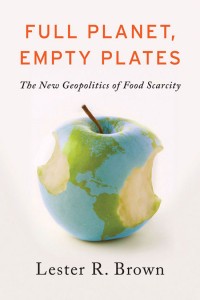Essay by S. Tom Bond, Retired Chemist & Resident Farmer, Lewis County, WV
It is remarkable how few of us realize (in more than an academic way) our human dependence on nature. Preagrocultural people lived closer to nature and were more familiar with ups and downs due to weather, crop disease, climate change, invasive species and a host of effects we know about, but seldom have to worry about.
Groups of tribal people were often caused to go extinct. One thinks about the drying of the Sahara early in the movement of modern humans out of Africa, and the near extinction of the Solutrean people in Europe, who narrowly missed becoming extinct in the Ice Age. At one time the entire human population was reduced to 2500 breeding pairs, according to DNA evidence.
The development of agriculture, first cultivation of cereal grains, then other crops and domestic animals, allowed storage and transportation of food and hierarchical government. From 6000 years ago more and more people have been freed from producing food, until today only about 1% of the population is engaged in it. All in advanced society are relatively food secure. Unfortunately, they are intellectually disengaged and emotionally unaware.
Only the poor have to worry about food, mostly those in underdeveloped places and the economically disadvantaged in the developed world, including one-third of United States citizens. Hunger here is a political problem, not an environmental problem.
Our education is poor in this respect. Our individual drive for money and comfort, not to mention social leadership, has lead us to abandon learning about vast areas of the reality of the world we live in. Our ultimate dependence on living matter is lost in the hustle and bustle of the 12, 16, 20 or more years of education we receive. The connection to the rest of the living world is ignored.
We even have a new form of Christianity, invented in the last half-century, which actively emphasizes Genesis 1:26, which mentions “dominion.” It is not in the other creation story in Genesis, but it is attractive to those who want strong leadership, because it justifies social control, too.
The highly developed agriculture of our era is not a permanent fix. Population expansion and resource degradation are on an accelerating course. Many times in the past whole societies have been wiped out or drastically collapsed by soil depletion, extended drought, rise in sea level, volcanoes, and other “acts of Nature.” Sometimes these occur in combination.
Today, we humans have much greater capacity to influence the living world. We now require over 20% of the carbon fixed each year by photosynthesis in part on land and other carbon fixed in the sea. Another authoritative study finds the percent of utilization doubled from 1900 to 2000. This is in spite of the 4-fold increase in human population. Increases of production of food, particularly, but also wood and fiber are due to increased crop yields, and to a much smaller extent decreased use per capita due to substitution of fossil fuels for biofuels. The cost has been degradation of soils, environmental damage, and conversion (loss) of farmland to developed areas.
The Earth is finite. We humans possess the ability to affect the environment of the living world with our modern industry based on vast amounts of energy from fossil fuels. Global warming, transfer of farm land to other uses, contamination of land and water, and most of all, ignorance of our situation all threaten the living world. If we wait until the most successful among us begin to hurt, there is little chance to prevent a collapse of society, and perhaps extinction of humanity and other life forms.

